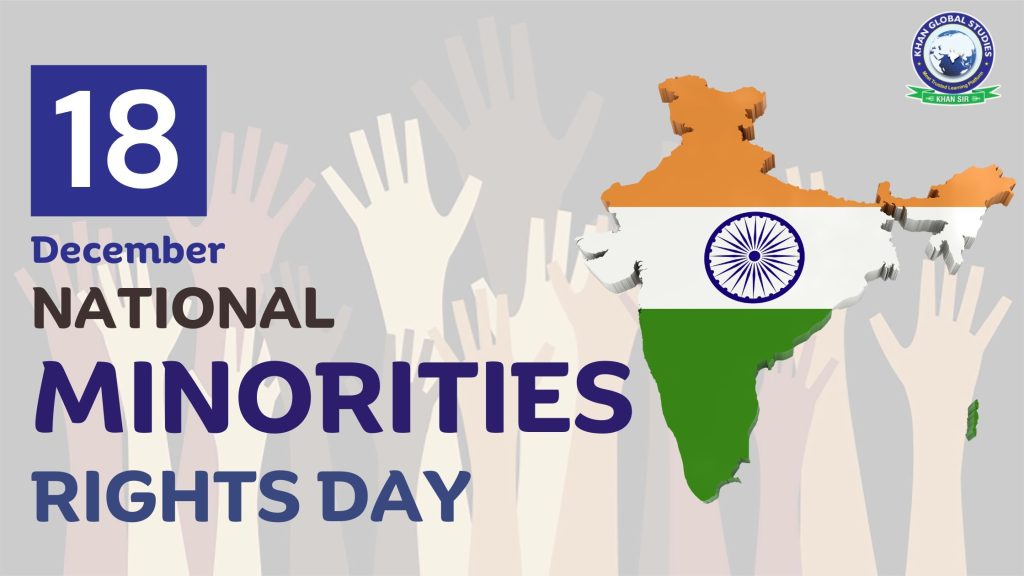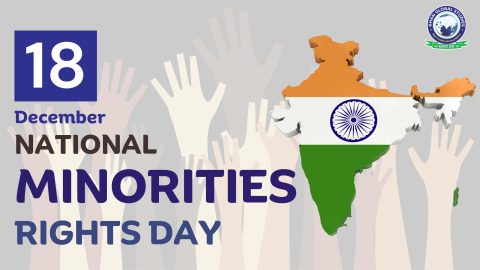Minorities Rights Day is observed every year on December 18 in India. This day is dedicated to ensuring the rights of minorities, protecting their interests, and safeguarding their well-being. It is a significant initiative toward eradicating discrimination against minorities and promoting equal opportunities for all.
Historical Background
In India, Minorities Rights Day is organized by the National Commission for Minorities. The primary goal of this observance is to foster religious harmony, mutual respect, and understanding among all communities.
Globally, this day aligns with December 18, 1992, when the United Nations adopted the “Declaration on the Rights of Persons Belonging to National or Ethnic, Religious, and Linguistic Minorities.” This declaration emphasizes the recognition and preservation of minority groups’ identities and rights, improving their quality of life, and promoting their cultural and linguistic heritage.
History of Minorities Rights Day
The National Commission for Minorities observes this day in India with the aim of encouraging religious harmony, mutual respect, and a better understanding of minority communities.
On December 18, 1992, the United Nations issued a declaration on the “Rights of Religious, Linguistic, National, and Ethnic Minorities.” This declaration focused on maintaining and respecting the cultural, religious, linguistic, and national identities of minorities, along with safeguarding their rights. It also emphasized the responsibility of governments to improve the socio-economic conditions of minorities and raise awareness about their unique identities.
Significance of Minorities Rights Day
India is a multicultural, multi-religious, and multilingual nation where people from diverse religious, ethnic, linguistic, and cultural backgrounds coexist harmoniously. While the Indian Constitution guarantees equality for all citizens, certain sections of society require special protections to integrate with the mainstream. The primary objectives of this day include:
- Protecting the rights of minorities.
- Promoting communal harmony.
- Eliminating discrimination and inequality.
- Ensuring the social, economic, and educational development of minorities.
Ministry of Minority Affairs
To focus on the welfare and development of minority communities, the Ministry of Minority Affairs was established on January 29, 2006, after being separated from the Ministry of Social Justice and Environment. This ministry is dedicated to addressing the issues concerning notified minority communities such as Muslims, Christians, Buddhists, Sikhs, Parsis, and Jains. It formulates policies, evaluates development programs, and reviews regulatory frameworks for the betterment of these communities.
National Commission for Minorities
The National Commission for Minorities (NCM) was established under the National Commission for Minorities Act, 1992. Initially, Muslims, Christians, Sikhs, Buddhists, and Parsis were recognized as minority communities. Later, on January 27, 2014, the Jain community was also granted minority status.
In addition to the central NCM, several states, including Andhra Pradesh, Assam, Bihar, Karnataka, and Maharashtra, have established State Minority Commissions. These commissions address grievances from minority communities and ensure the enforcement of their legal and constitutional rights.
State-Level Minority Commissions
State Minority Commissions have been established in various states of India, including Andhra Pradesh, Assam, Bihar, Chhattisgarh, Delhi, Jharkhand, Karnataka, Maharashtra, Madhya Pradesh, Manipur, Rajasthan, Tamil Nadu, Uttarakhand, Uttar Pradesh, and West Bengal. These commissions are headquartered in the respective state capitals and are responsible for ensuring the protection of the constitutional and legal rights of minorities.
Individuals from minority communities can file grievances with their respective state commissions. If the issue remains unresolved at the state level, they may escalate their petition to the National Commission for Minorities.
Rights of Minorities in India
The Indian Constitution includes several provisions to safeguard the rights of minorities. Some of the key provisions are:
- Articles 29 and 30: Grant minorities the right to preserve their culture, language, and religion. They also allow minority communities to establish and manage their educational institutions.
- Articles 14 and 15: Guarantee the right to equality and prohibit discrimination based on religion, caste, gender, language, or region.
- Articles 25 to 28: Provide all citizens the freedom to practice, propagate, and profess their religion.
- National Commission for Minorities Act, 1992: Establishes the National Commission for Minorities to ensure the protection of minority rights.
FAQs
Q: Which group was first granted minority status in India?
Ans: Muslims were the first community to be recognized as a minority in India.
Q: When is Minorities Rights Day observed in India?
Ans: It is observed annually on December 18.
Q: Who are considered minorities in India?
Ans: Muslims, Christians, Sikhs, Buddhists, Parsis, and Jains are designated as national minorities in India.
Q: What constitutional provisions protect minority rights in India?
Ans: Articles 14, 15, 25-28, 29, and 30 of the Indian Constitution safeguard minority rights.
Q: What is the objective of Minorities Rights Day?
Ans: The day aims to protect minority rights, eliminate discrimination, and ensure their social, economic, and educational development.
Q: What is the role of the United Nations in this observance?
Ans: On December 18, 1992, the United Nations adopted a resolution advocating the protection of the rights of religious and linguistic minorities.
Q: Is Article 29 only for minorities?
Ans: No, Article 29 protects the cultural and educational identity of any section of citizens, not just minorities.
Minorities Rights Day is observed every year on December 18 to raise awareness about the rights of minority communities and to emphasize their empowerment and development. It serves as a reminder that fostering equality and inclusivity is essential for building a progressive and prosperous society.




